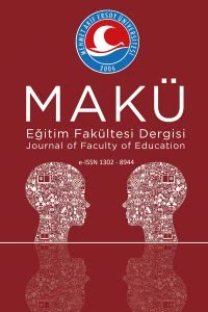Matematik Öğretmenleri'nin Etkileşim Düzeyleri
Öğretmenler, öğretim sürecinin en önemli unsurlarıdır. Bu nedenle, matematik öğretmenlerinin kendilerini sürekli yenileme peşinde olmaları gerekmektedir. Bu gelişimi sağlamanın en önemli yollarından birisi ise birbirleriyle ve diğer öğretmenlerle sürekli etkileşim içerisinde olmalarıdır. Bu çalışmada, matematik öğretmenlerinin birbirleriyle ve diğer öğretmenlerle aralarındaki etkileşim durumları kıdem ve cinsiyet değişkenleri açısından belirlenmeye çalışılmıştır. Bunun için, 14 maddeden oluşan bir ölçekten yararlanılmıştır. Yapılan faktör analizi sonucunda, ölçeğin dört faktörden oluştuğu ve tek faktöre yönelik toplam varyansı açıklama oranının .37 ve Cronbach Alfa Güvenirlik Katsayısının ise .86 olduğu belirlenmiştir. Ölçek bu haliyle, 2003-2004 eğitim-öğretim yılı II. döneminde Sivas il merkezinde bulunan 25 resmi ilköğretim okulunda görev yapan 40 matematik öğretmenine uygulanmıştır. Verilerin analizi sonucunda, matematik öğretmenlerinin birbirleriyle ve diğer öğretmenlerle; öğretimle ilgili fikirleri paylaşma, kendini yetiştirme, meslektaşlarıyla işbirliği içinde olma ve iletişim kurma bakımından genellikle “ayda bir” etkileşim içerisine girdikleri belirlenmiştir. Ayrıca, erkek matematik öğretmenlerinin, bayan matematik öğretmenlerine göre öğretimle ilgili fikirleri paylaşma ve kendini yetiştirme bakımından daha fazla çaba harcadıkları ve kıdemin bu faktörler üzerinde anlamlı bir etkisinin olmadığı da tespit edilmiştir.
Interaction Levels of Mathematics Teachers
Teachers are the most important part of the teaching process. Therefore, mathematics teachers should be open minded about making reflections on their teaching and self-training. One of the most important ways to make that happen is to interact each other and other teachers in a continuous manner. The present study attempted to examine mathematics teachers’ interactions with each other and other teachers based on teaching experince and sex variables. An instrument including 14 items was used in the study. Factor anaylsis showed that the instrument included four factors and one-factor analysis of variance is .37 and Cronbach α =.86. During the education in 2003-2004, the instrument was administered to 40 teachers in 25 elementary and middle schools in Sivas. Analysis of data showed that mathematics teachers interacted with each other and other tecahers once a month with regard to sharing their ideas about teaching, self-training, collaboration with their colleagues, and making communication with others. Moreover, as opposed to female mathematics tecahers, male mathematics teachers made a more effort to share their ideas about teaching and self-training. It was also found that there was no meaninful relation between teaching experince and the factors mentioned above.
___
Cwikla, J. (2004). Less Experinced Mathematics Teachers Report What is Wrong with their Professional Support System. Teachers and Teaching. Theory and Practice. 10 (2). 181,197.Dursun, Ş. ve Dede, Y. (2004). Öğrencilerin Matematikte Başarısını Etkileyen Faktörler: Matematik Öğretmenlerinin Görüşleri Bakımından. Gazi Ün. Gazi Eğitim Fak. Dergisi. 24(2), 217-230.
Lewis,C., Perry, R.&Murata, A. (2003, April). Lesson Study and Teachers' Knowledge Development: Collaborative Critique of a Research Model and Methods. American Educational Research Association Annual Meeting (AERA). Division K, Section 7. Chicago, IL.
Lewis,C., Perry, R.&Murata, A. (2004, April). What Constitutes Evidence of Teachers’ Learning from Lesson Study? American Educational Research Association Annual Meeting (AERA), Division K, Section 7. San Diego, CA.
McREL. (2001). What are the characteristics of effective professional development for mathematics, pg. 30-31? From EdThoughts: What We Know About Mathematics Teaching and Learning. http://www.mcrel.org/PDF/EDThoughtsMath/6804IR_ED ThoughtsMath_14.pdf. (September 14, 2004).
Meece, J.(1996). Gender Differences in Mathematics Achievement: The Role of Motivation. Yayımlandığı Kitap M. Carr (Editör), Motivation in Mathematics. Hampton Press, Inc. Cresskill, New Jersey. 113-130.
Papanastasiou, C. (2002). Effects of Background and School Factors on the Mathematics Achievement. Educational Research and Evaluation. 8(1), 55-70.
Tavşancıl, E. (2002). Tutumların Ölçülmesi ve SPSS ile Veri Analizi. 1. Baskı Nobel Yay. Ankara.
Tekin, H. (1993). Eğitimde Ölçme ve Değerlendirme. Yargı yay. (7. Baskı). Ankara.
Thair, M. (1999). The Responsiveness of an Australian Science Teacher Professional Development Program to the Needs of Local and Developing Country Science Educators. This thesis is presented as part of the requirements for the award of the degree of doctor of Philosophy of the Curtin University of Technology. Australia.
The Third International Mathematics and Science Study Repeat (TIMSS-R). (1999). Philippine Report. Volume 2. Mathematics. _____http:www. sei.dost. gov. ph/timss-mdoc >, (2003, Ocak 22).
Wu, H. (1999). Professional Development of Mathematics Teachers. Notıces of the Ams. 4(5) 535-542.
- ISSN: 1302-8944
- Yayın Aralığı: Yılda 4 Sayı
- Başlangıç: 2007
- Yayıncı: BURDUR MEHMET AKİF ERSOY ÜNİVERSİTESİ
Sayıdaki Diğer Makaleler
Küresel ve Sosyal Politikalar Açısından Burdur Şeker Fabrikası
Müziksel İşitmenin Temel Prensipleri
Matematik Eğitiminde Çoklu Zeka Kuramına Yönelik Öğretmen Düşünceleri
KÜRŞAT YENİLMEZ, ERHAN BOZKURT
Müzik Öğretmeni Adaylarının Mesleki Kaygıları
Piyano Eğitiminde Alıştırma Yapmanın Önemi ve Bazı Öneriler
Türkiye'de Müzik Öğretmenliğine Yönelme Nedenleri
Fakir Baykurt'un Romanlarında Eğitim İzleği
